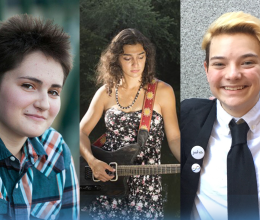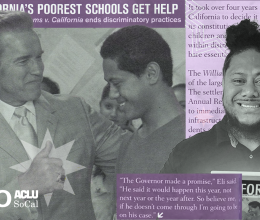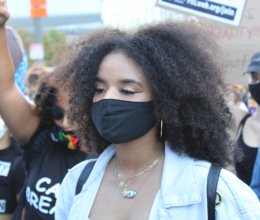
Define "defiance."
I've posed this statement to school administrators across the country after they've used it to kick students out of school. Some for dancing, breaking the dress code, or not paying attention. I myself had this experience. One of my earliest school memories was of being deprived of my right to an education after I wrote a curse word on a classwork assignment. I returned from school a week later and spent the rest of my 1st grade year trying to catch up with my classmates.
Yes, there are student behaviors that require a response. As a former educator, I also know the response itself is what makes a difference.
Right now, in California, there are 24 different reasons to suspend students from school, in addition to the broad "disruption or willful defiance" category. It's a highly subjective catch-all category that punishes students with disabilities and students of color at alarmingly disparate rates. It must be abolished if we want to develop and nurture students rather than toss them away into the school-to-prison pipeline.
Governor Brown just devoted a significant increase in funding to schools to allow for evidence-based supports like restorative justice and Positive Behavioral Intervention and Supports. But investing money in the classroom isn't enough if we're suspending hundreds of thousands of students each year.
Last year alone, California students were suspended over 380,000 times during the 2016-17 school year. With recent studies showing that suspensions predict higher dropout rates and greater risk of adult incarceration, the stakes couldn't be higher.
That's why I'll be at Governor Brown's doorstep with youth, organizers, parents, and advocates this week after traveling on a 440+ mile caravan. We are driving from Southern California to Sacramento to call on the governor to support a state bill (SB 607) that will encourage schools to find ways to keep students in the classroom, not kick them out.
We need SB 607 to protect California students from discriminatory and harmful school climates. The bill would make sure that all students get a quality education regardless of who they are. Specifically, SB 607 will eliminate the use of suspension and expulsion for minor offenses covered under the "disruption or willful defiance" category for California K-12 students.
California made headway in 2013 when the Legislature passed a bill to eliminate the suspension of students in grades K-3. Since then, suspensions in elementary schools dropped 60 percent. But California continues to suspend tens of thousands of students in grades 4-12 each year and, the K-3 law is set to expire this July.
We need a more inclusive and long-lasting fix to keep our students in the classroom where they belong. This is one of the most pressing civil rights issues of our time.
Just take a look at California suspensions by the numbers and judge for yourself:
- In Los Angeles County in the 2016-17 school year, Black students were less than 8 percent of students but 30 percent of disruption/defiance suspensions. In many places like LA County, "defiance" seems to be a euphemism for Blackness.
- LATINO boys were given 42 percent of disruption/defiance suspensions. They are only 28 percent of CA students.
- LOW-INCOME students were given 83 percent of disruption/defiance suspensions. They are only 61 percent of CA students.
- STUDENTS WITH DISABILITIES were given 28 percent of disruption/defiance suspensions. They are only 12 percent of CA students.
- A 2017 study I published with the UCLA Civil Rights Project found Disruption/defiance suspensions also accounted for 71 percent of the Latino-White gap in lost instruction in California's districts with the largest disparities.
- California's students lost over 250,000 days of instruction because of disruption/defiance suspensions. That's over a million hours that students could have been in class learning English, Math or subjects.
- Research has found the school discipline gap to contributes to up to one-fifth of the achievement/opportunity gap.
- A study followed every tenth-grade student in California for three years and estimated that the long-term cost of suspensions for the state, for that one cohort, would total to $2.7 billion.
Join us in calling on Governor Brown and state lawmakers to support SB 607 to make sure our education system respects and educates ALL students — even the "defiant" ones. Send a message using a form from our partner organization, Youth Justice Coalition.







